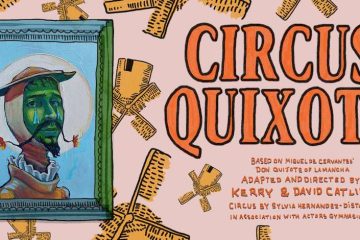Welcome Back, Lookingglass!
After a pandemic-related programming pause, Chicago’s Tony-winning Lookingglass Theatre Company returns with a new season of programming, including their current production of Circus Quixote, based on Miquel de Cervantes’s novel. Longtime LTC ensemble member and newly appointed artistic director Kasey Foster discusses how Lookingglass managed to survive the pandemic; how they created a much more welcoming presence on Michigan Avenue; how she’s gone from being a performer to being a classic actor-manager; and most importantly, how Lookingglass offers the sort of performance spectacle you can only get in a live theatre experience. (Length 19:25)
Podcast: Download (Duration: 19:25 — 22.3MB)
